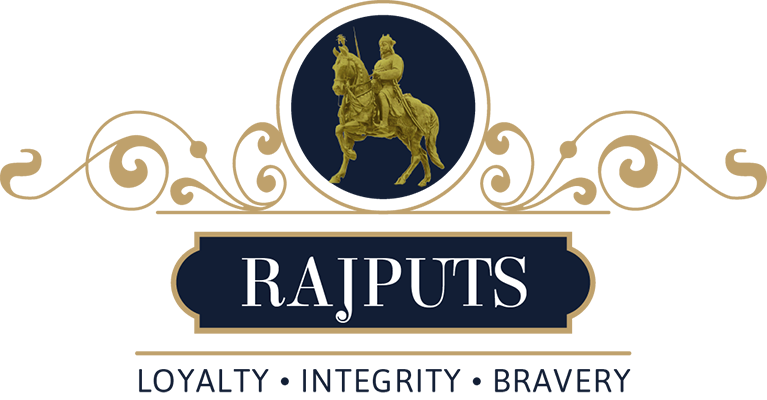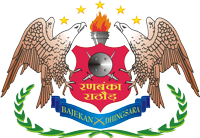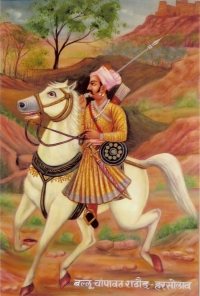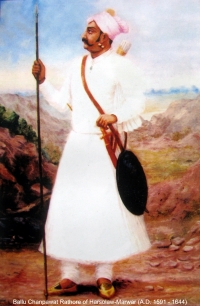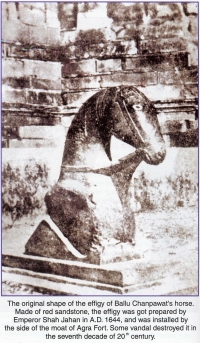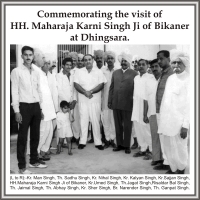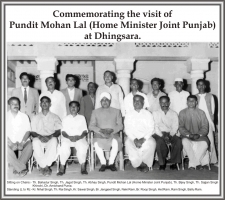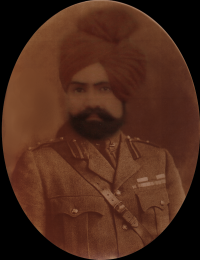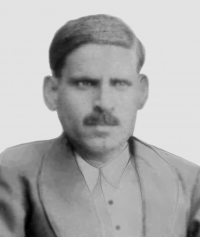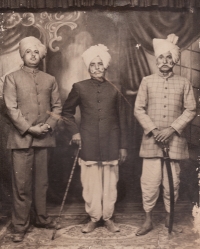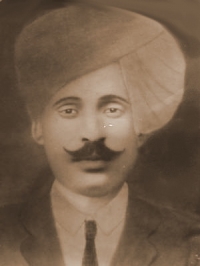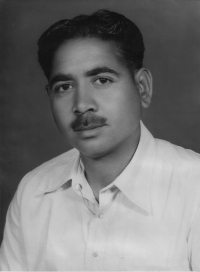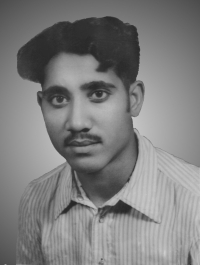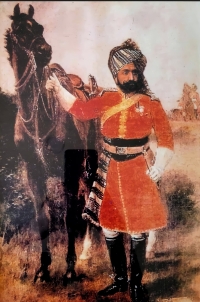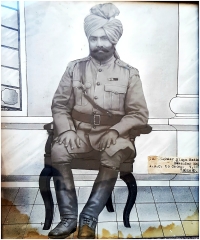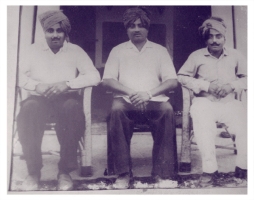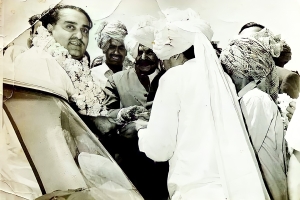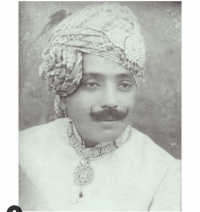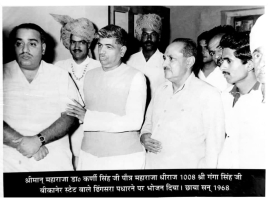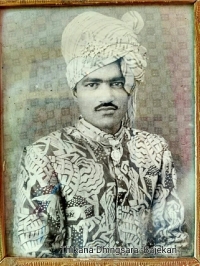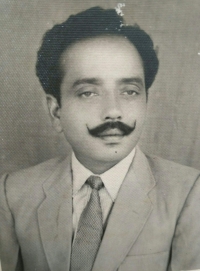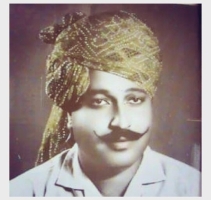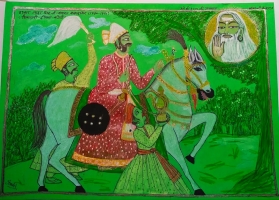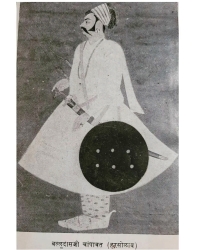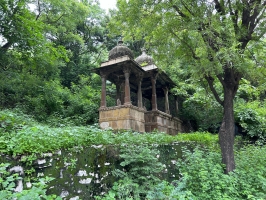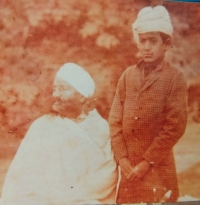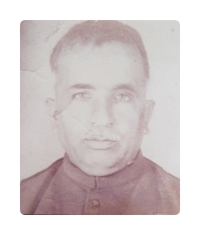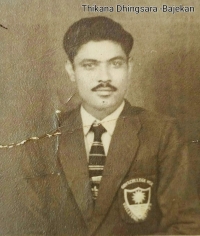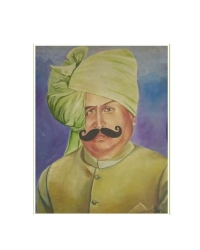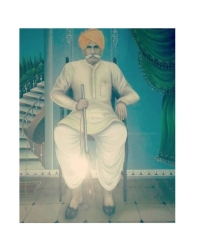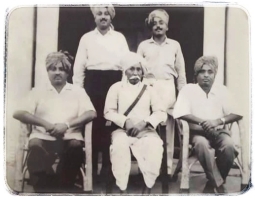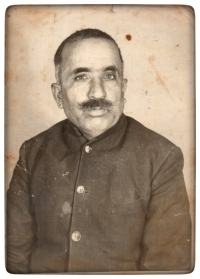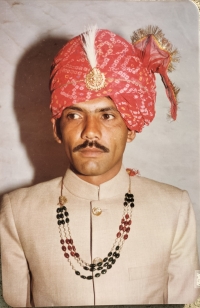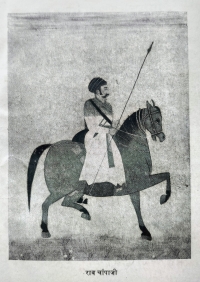History
- Rao CHAMPAJI,1st Thakur Sahib of Kaparda 1416/1466; brother of Rao JODHA, founder of Jodhpur.
- Rao BHAIRODASJI of Kaparda 1466/1520
- Rao JAISAJI of Kaparda and Ransingaon
- Rao MANDANJI of Ransingaon
- Rao GOPAL DASJI of Ransingaon, died .
- Rao BALLUJI of Harsola
- Rao DUDAJI of Balotra (1664)
- Thakur JASWANT SINGH of Singari (1672) and Dhandiyan (1708)
- Thakur GUMAN SINGH of Singari
- Thakur SAYAB SINGH
- Thakur CHAIN SINGH
- Thakur RAJ SINGH
- Thakur NAHAR SINGH, founder of Bajekan-Dhingsara (Homepage) (continued below)
Ballu Champawat Rathore of Harsolaw
Ballu Champawat Rathore (A.D. 1591-1644), of Harsolaw in Marwar was a dauntless warrior of the period. He had a glorious line of ancestry. He was a man of sterling qualities, and of unimpeachable character. In him there was a confluence of the streams of valor and self-respect; both flowed together plenteously in him. He had fought 34 battles in his career. But these battles alone were not enough to put him among the worthies of history. What gave him an abiding place in history was his miraculous valor, demonstrated by him at the Agra Fort in July, 1644.
On 25th July, 1644, an exciting event had occurred in the imperial court at Agra Fort. Mir Bakshi Salabat Khan had uttered a provocative remark to Amar Singh Rathore, which stirred up his feelings to a fever pitch; and he spontaneously thrust his dagger in the chest of Salabat Khan, the latter died on the spot. To take vengeance on Amar Singh, the Emperor's security officers, guards and mace bearers, made a ruthless assault upon him, and a gruesome fight had started. Amar Singh offered a tough resistance, but he was soon overpowered by the Emperor's men, and finally was slain. To recover the dead body of Amar Singh, laid in the Emperor's custody, was a mighty challenge before Ballu Champawat. At that crucial moment, Ballu had displayed rare qualities of fidelity, honor and bravery which made him a figure of high regard. Nothing daunted Ballu, he entered into the Agra Fort, hurriedly picked up the corpse, or the severed head, and put it on horseback; pressed his thighs in sudden quick pull, and gave a twitch to the horse. The horse in quickness, with the speed of a bullet, dashed, and leapt over the ramparts; it fell by the sight of the moat, where it breathed its last. Ballu had carried out his plan successfully; brought the corpse or the severed head of Amar Singh Rathore from the jaws of death; and handed over the same to his 'ranies' (wives) who were waiting for it in order to become 'Sati'. Ballu's valorous feat was unparalleled in the historical records of the world. This incident had happened on 26th July, 1644.
To avenge his (Rao Amar Singh Rathore) death, his retainers, headed by Ballu Champawat..., put on their saffron garments, and a fresh carnage ensued within the 'Lal Quila' (Red Fort of Agra)... The pillars of Agra bear testimony to their deeds, nor shall they ever be obliterated from the records of time: they made their obeisance to Amar in the mansions of the sun. ~ James Tod : Annals and Antiquities of RajasthanBut this was not the end of Ballu's story. The same day the Emperor's forces were in chase of Ballu. A grim battle had occurred outside the Agra Fort between Ballu's men and Emperor Shah Jahan's forces, where the valiant Rathore cut the troops of the enemy and threw each corpse a headless torso. Ballu fought the battle in his euphoric spree even when beheaded. The battle-great Ballu thus made history - different and distinct from other warriors known in history.
By the sheer dint of his miraculous valor shown by Ballu Champawat at the Agra Fort, he unquestionably earned an immortal place and an undying fame in the annals of history. We are proud to be a part of such a royal and brave lineage coming from one of the greatest warrior in Rajput history.
History of Thakur Nahar Singh Ji
Rao Balludas was the 4th son of Rao Gopaldas Ji Champawat, Prime minister of Marwar state under Maharaja Udai Singh. Balludas Ji was the elder brother of Vithaldas Ji Champawat, both sons of the Bhati queen of Rao Gopaldas. Balludas Ji had received the jagir of Harsolav by Jodhpur Maharaja Gaj Singh on the occasion of Dussehra, 30th Oct 1619. But he relinquished his jagir when Prince Amar Singh was banished by his father, Gaj Singh. Balludas Ji along with Bhau Singh Kumpawat and a few other chiefs also left Marwar to demonstrate their unflinching loyalty to Amar Singh, whom they deemed their master.
Balludas Ji and Amar Singh joined Imperial service as Mansabdar under Shah Jahan. Balludas on one occasion had a heated argument with his master, Amar Singh on a trivial matter and Balluji, a man of immense self-esteem, left Agra. He later wandered all around Rajputana states from Bikaner to Bundi, Jaipur to Udaipur, serving many rulers such as Karan Singh of Bikaner, Mirza Jai Singh of Amber, Shatrusal Hada and eventually Maharana Jagat Singh Ji. He couldn't stay at any of the above states because of his uncompromising nature and straight-forward attitude. Lastly, he returned to Agra and resumed his Mansabdari (imperial service). He fought many battles for the Mughals, from Khyber to Kashmir and Agra to Bengal. He died in at Agra.
Rao Duda, the second son of Balludas Ji Champawat took revenge of his father and Amar Singh from Gaurs of Ajmer. Rao Duda was granted the prestigious jagir of Balotra by Maharaja Jaswant Singh Ji due to immense sacrifice made by sons and grandsons of Balludas Champawat in the Battle of Dharmat (1658). He was killed in the Battle of Bilada (1687) against Subahdar of Ajmer during the Rathore War for Independence led by Durgadas Karnot and Sonagji Chamapwat.
Thakur Jaswant Singh, only son of Rao Duda Champawat received jagir of Singari (Rohet, Pali) in 1672 in the lifetime of his father. An able administrator, he look after general administration of Marwar. He was seriously injured and his 40 retainers were killed in 1708 when Marwar fought a war against Amber over Sambhar salt lake. For invaluable contribution of his family, he received Dhandiya (Luni, Jodhpur) and jagirs in Shekhawati region by Maharaja Ajit Singh. He died peacefully at Singari in 1718.
Thakur Nahar Singh ,born in at Singari to Thakur Raj Singh. His grandfather, Thakur Chain Singh was adopted by Thakur Sayab Singh. Nahar Singh along with Thakur Zalim Singh of Harsolav stood with Thakur Sawai Singh Pokhran to place Prince Dhonkal Singh, posthumous son of Maharaja Bhim Singh, on the throne. The battle of Gingoli (Parbatsar) fought in 1807 between Marwar and anti Man Singh coalition force led by Sawai Singh Champawat of Pokhran. Later when Sawai Singh was killed at Mudawa in March 1808, Nahar Singh, Zalim Singh had to escape from Nagaur along with Prince Dhonkal Singh towards Bikaner. To punish the Champawats who had switched sides at Gingoli battle, Man Singh confiscated several jagirs of Balludasot Champawats including Singari and Harsolav and then gradually, Man Singh isolated Prince Dhonkal Singh and his followers by making treaties with Bikaner, Jaipur and the fateful subsidiary alliance with English. Later Maharaja Man Singh through his Diwan, Indraj Singhvi had offered to pardon them provided they surrender and seek unconditional apology. This offer was outright rejected by Thakur Zalim Singh Champawat. For a while, Prince Dhonkal Singh along with Nahar Singh and Zalim Singh sought refuge in Shekhawati region such as Khetri and Mahansar. With no way in sight, Zalim Singh led Dhonkal Singh to Delhi, while enroute at Jaipur, they met an East India Company officer. Here the Prince Dhonkal Singh along with Nahar Singh of Singari, Zalim Singh of Harsolav, Bakhtawar Singh of Salawas (all Balludasot Champawats) made agreement to fight for English. All these Rathores helped the English to conquer the Bhattiana region, stretching from Hisar to Hanumangarh (Bhatner) which was dominated by Bhatti Sikhs and Muslims. For their bravery and services, Nahar Singh received Zamindari of Dhingsara (14 villages), Zalim Singh received Bhana. Bhaktawar Singh purchased Sindol village near Hisar. Thakur Zalim died without an heir and later, Harsolav was restored to his brothers in around the 1850s (a peace brokered by Thakur Zorawar Singh Champawat of Kanota).
Thakur Nahar Singh Champawat became a follower of a saint Baba Mansagar. Mansagar Baba got Nahar Singh married into Tanwar Rajputs of Buhana, Jhunjhunu. Thakur Nahar Singh aided in administration of Sirsa region, he was the last Kotwal or the Police chief of Sirsa city. On account of his old age, he retired. At last, he purchased Bajekan village, near Sirsa in an auction. He died in at Dhingsara (Fatehabad, Haryana).
Genealogy
- Th. Nahar Singh
- Th. Surat Singh (qv)
- Th. Takhat Singh
- Th. Agar Singh
- Th. Sadhu Singh
- Th. Mahaveer Singh
- Th. Ghanshyam Singh
- Kr. Prabhakar Singh
- Kr. Yuduraj Singh
- Th. Kushal Singh
- Kr. Devender Singh
- Kr. Shailender Singh
- Th. Lokman Singh
- Th. Sangram Singh
- Kr. Shivraj Singh
- Kr. Vikrant Singh
- Th. Ghanshyam Singh
- Th. Mahaveer Singh
- Th. Daulat Singh married at Ghudla
- Th. Sadhu Singh
- Th. Nandlal Singh
- Th. Kishan Singh
- Th. Hari Singh
- Baisa Roop Kanwar, married Lt. Th. Surendra Singh Rajawat of thikana Dehlod (Sawai Madhopur) and had issues, 4 daughters.
- Vijay Rajawat, married Raja Gajendra Singh Ralawata of thikana Ralawata (Ajmer). Her family lives in Ajmer.
- Anju Rajawat, married Kr. Govind Prasad Singh Sengar of thikana Karauli. Her family lives in Ajmer.
- Sanjay Rajawat, married Kr. Ajit Singh Rathore of thikana Gingoli (Nagour). Her family lives in Jodhpur.
- Kamini Rajawat, married Kr. Gajendra Singh Rathore of thikana Karonj (Kekri). Her family lives in Dudu.
- Baisa Raj Kanwar
- Baisa Prem Kanwar
- Th. Nihal Singh
- Kr. Raghuraj Singh
- Th. Rawat Singh
- Kr. Ravinder Singh
- Kr. Narender Singh
- Kr. Pushpender Singh
- Kr. Lokender Singh
- Kr. Nagender Singh
- Kr. Ravinder Singh
- Baisa Ratan Kanwar, married Lt. Th. Virendra Singh Rajawat of thikana Dehlod (Sawai Madhopur) and had issues, 2 sons.
- Kunwar Nagendra Singh Rajawat
- Kunwar Yadvendra Singh Rajawat
- Th. Hanuwant Singh
- Kr. Dushyant Singh
- Kr. Hameer Singh
- Baisa Yashwant Kanwar
- Baisa Roop Kanwar, married Lt. Th. Surendra Singh Rajawat of thikana Dehlod (Sawai Madhopur) and had issues, 4 daughters.
- Th. Agar Singh
- Th. Prithvi Singh
- Th. Ganpat Singh
- Th. Madho Singh
- Th. Roop Singh
- Th. Yatinder Singh
- Th. Yoginder Singh
- Kr. Rudraveer Singh
- Kr. AmetVikram Singh
- Th. Jangjeet Singh
- Th. Virender Singh
- Th. Diwaker Singh
- Kr. LakshyaRaj Singh
- Th. Karan Singh
- Th. Narendra Singh
- Kr. Anirudh Singh
- Br. Kirti Singh
- Kr. Ashwini Singh
- Kr. Anirudh Singh
- Th. Roop Singh
- Th. Madho Singh
- Th. Bane Singh
- Th. Bijey Singh
- Th. Umed Singh
- Th. Bhim Singh
- Kr. Bhooraj Singh
- Br. Chanderveer Singh
- Kr. Yograj Singh
- Br. Manvendra Singh
- Kr. Nitiraj Singh
- Br. Lokvardhan Singh
- Kr. Bhooraj Singh
- Th. Chagan Singh
- Kr. Gajendra Singh
- Br. Kartik Singh
- Kr. Bhupat Singh
- Br. Harshit Singh
- Kr. Tribhuwan Singh married at Kali Pahari
- Kr. Gajendra Singh
- Th. Tej Singh
- Kr. Dependra Singh
- Br. Shantanu Singh
- Kr. Shailender Singh
- Kr. Kuldeep Singh
- Kr. Dependra Singh
- Th. Bahadur Singh
- Th. Dharmender Singh
- Kr. Abhimanyu Singh
- Br. Kushmanyu Singh
- Kr. Abhimanyu Singh
- Th. Yudhishter Singh
- Kr. Harendra Singh
- Th. Bhupendra Singh
- Kr. Vikramdev Singh
- Th. Dharmender Singh
- Th. Sumer Singh
- Kr. Kamal Singh
- Br. Dhruv Singh
- Kr. Devraj Singh
- Br. Rahul Singh
- Kr. Kamal Singh
- Th. Bijey Singh
- Th. Ganpat Singh
- Th. Surat Singh
- Th. Hamir Singh (qv)
- Risaldar Major Th. Chander Singh, born in , educated as Aitchison College, Lahore; Commissioned in 5th Bengal Cavalry on 1st Sept 1892 as Jemadar. Married Phool Kanwar of Satnali in 1893 and had issues. He was awarded “India Medal” (Indian General Service Medal) three times; 1st for serving at North-western frontier in 1895, 2nd for his service in Tirah Campaign (1897) and 3rd for his service in Mahsud Blockade in Waziristan (1901-02). On 19th Jan 1902 he was promoted to Ressaidar and later on 19th May 1908 promoted to Risaldar rank. At the outbreak of World War in 1914 he served at Western front (France and Belgium) in the Battle of Verdun and Somne (1916). On 1st May 1915 he got promoted to Risaldar Major. In 1917 returned back to India and again served at North Western frontier. He finally retired on 1st Jan 1919. For his faithful service of 27 years, he was awarded with “Indian Distinguished Service Medal” and was made Honorary Captain.
- Th. Ganga Singh
- Th. Ajit Singh
- Th. Kumer Singh
- Kr. Rajveer Singh
- Aditya Singh, died young.
- Pradyuman Singh
- Kr. Rajveer Singh
- Th. Sardar Singh
- Kr. Jaiveer Singh
- Dr. Ayushi Rathore (M.B.B.S)
- Kr. Jaiveer Singh
- Th. Mahendra Singh
- Baisa Rachna Singh
- Baisa Manjula Singh
- Baisa Shubhangini Singh
- Th. Sajjan Singh
- Kr. Yashveer Singh
- Br. Digvijay Singh
- Kr. Yogveer Singh
- Baisa Niharika Singh
- Kr. Vikram Singh
- Kr. Yashveer Singh
- Th. Uday Singh
- Kr. Sanjay Singh
- Th. Kumer Singh
- Th. Ajit Singh
- Th. Mohan Singh
- Th. Bhopal Singh
- Th. Dashrath Singh
- Kr. Raghuraj Singh
- Th. Jitender Singh
- Kr. Rishiraj Singh
- Kr. Shrishte Singh
- Th. Dashrath Singh
- Th. Inder Singh
- Th. Bhaginder Singh
- Kr. Dhirendra Singh
- Th. Rajender Singh
- Kr. Parminder Singh
- Th. Dilbagh Singh
- Kr. Pushpender Singh
- Th. Jaswant Singh
- Kr. Raghvendra Singh
- Th. Bhaginder Singh
- Th. Bhopal Singh
- Th. Barisal Singh
- Th. Sawai Singh
- Th. Dharmender Singh
- Kr. Jaideep Singh
- Th. Ravinder Singh
- Kr. Rahul Singh
- Kr. Abhimanyu Singh
- Th. Dharmender Singh
- Th. Shivram Singh
- Kr. Rajan Singh
- Br. Yashraj Singh
- Kr. Rajan Singh
- Th. Ranbir Singh
- Th. Randhir Singh
- Kr. Praveen Singh
- Kr. Lokendra Singh
- Th. Sawai Singh
- Th. Ganga Singh
- Th. Gopal Singh
- Th. Jivraj Singh
- Th. Amar Singh
- Th. Jagat Singh
- Th. Prem Singh
- Kr. Devender Singh
- Br. Keshavraj Singh
- Kr. Devender Singh
- Th. Narender Singh
- Kr. Virendra Singh
- Br. Suryajay Singh
- Kr. Virendra Singh
- Th. Surender Singh
- Kr. Bhanu Pratap Singh
- Th. Prem Singh
- Th. Jivraj Singh
- Th. Govind Singh
- Th. Jagmal Singh
- Th. Kalyan Singh
- Th. Bharat Singh
- Kr. Deepak Singh
- Kr. Bhawani Singh
- Th. Arun Singh
- Kr. Hemant Singh
- Kr. Pradyuman Singh
- Th. Anil Singh
- Kr. Aditya Singh
- Th. Manoj Singh
- Th. Bharat Singh
- Th. Kalyan Singh
- Th. Lakshman Singh
- Th. Sher Singh
- Kr. Pradeep Singh
- Br. Shiv Singh
- Kr. Pramod Singh
- Kr. Pradeep Singh
- Th. Dalip Singh
- Th. Ashok Singh
- Kr. Aditya Singh
- Th. Lokender Singh
- Th. Ashok Singh
- Th. Vikram Singh
- Kr. Ravinder Singh
- Kr. Tribhuan Singh
- Th. Sher Singh
- Th. Fateh Singh
- Th. Ranbir Singh
- Kr. Yashveer Singh
- Kr. Jasveer Singh
- Kr. Rajveer Singh
- Th. Randhir Singh
- Kr. Kapil Singh
- Kr. Bhupender Singh
- Th. Ranbir Singh
- Th. Jaimal Singh
- Th. Maan Singh
- Th. Bhawani Singh
- Kr. Pratham Singh
- Th. Bhawani Singh
- Kr. Pushpendra Singh
- Th. Bhawani Singh
- Th. Tej Singh
- Kr. Jogender Singh
- Br. Yashveer Singh
- Kr. Revinder Singh
- Br. Dushyant Singh
- Kr. Jogender Singh
- Th. Karni Singh
- Kr. Richpal Singh
- Th. Shakti Singh
- Kr. Dharamveer Singh
- Th. Bheem Singh
- Kr. Bhaginder Singh
- Th. Jitender Singh
- Th. Bhupender Singh
- Th. Maan Singh
- Th. Jagmal Singh
- Th. Hamir Singh
- Th. Jawahar Singh (qv)
- Risaldar Major Th. Bal Singh
- Th. Ajit Singh
- Th. Dalip Singh
- Th. Madan Singh
- Th. Girver Singh
- Th. Shyam Singh
- Th. Raghuveer Singh
- Th. Kesari Singh
- Th. Jawahar Singh
- Th. Abhay Singh (qv)
- Th. Rai Singh (qv)
- Th. Abhay Singh, no issues.
- Th. Rai Singh
- Th. Ashwapat Singh (qv)
- Th. Kuldeep Singh, no issues.
- Baisa Sunita Kanwar, married to Ranvir Singh Chundawat of Lasani and has issues, two sons.
- Dushyant Singh Chundawat, married to Baisa Bhanu Shekhawat of Parshurampura.
- Karanveer Singh Chundawat
- Baisa Desh Kanwar, married to Jaideep Singh Jadon of Palpur (M.P) and has issue, one son.
- Himanshu Raj Singh Jadon
- Baisa Sansar Kanwar, married to Devendra Singh Shekhawat of Dabri (Dheer Singh) and has issue, one son.
- Laksyaraj Singh Shekhawat
- Thakur ASHWAPAT SINGH, born , died , was an active member and past District Governor of Rotary Club Sirsa, married 5th September 1977 in Jaipur, Thakurani Nisha Kanwar, daughter of the late. Brig. Hari Singh Deora A.V.S.M of Galthani, and his wife, Thakurani Shyama Kumari of Kankarwa, she is a past District Chairman of Inerwheel Club Sirsa and past Haryana Pradesh Mahila Congress State Secretary, and has issue.
- Kunwar Akshaynidhi Rathore, born , educated at B.R.C.M Public School, Bahal (Higher Secondary Degree), and at D.A.V College Chandigarh (B.A.), married Kunwarani Ritwija Chauhan, daughter of the late Dr. Ranjeet Singh Chauhan of Kotharia, and has issues, three daughters and a son.He's a convicted criminal under sections 420, 120-B, 467, 468, and 471 of IPC.
- Anandini Rathore, born .
- Anurati Rathore, born .
- Kunwar Abhinay Rathore (Home Page), owner of this website, educated at B.R.C.M Public School, Bahal (Higher Secondary Degree), at Maharana Pratap College of Technology, Gwalior (Bachelor of Engineering in Computer Science), and at the University of Missouri-Rolla, U.S.A (Masters Degree in Computer Science), presently working in the U.S.A. with Facebook/WhatsApp; married on 29th March 2008 to Kunwarani Pragati Shekhawat, daughter of Thakur Hari Dayal Singh Shekhawat of Khayali, and has issue, one son.
- Kunwar Aryaman Rathore
- Kunwar Akshaynidhi Rathore, born , educated at B.R.C.M Public School, Bahal (Higher Secondary Degree), and at D.A.V College Chandigarh (B.A.), married Kunwarani Ritwija Chauhan, daughter of the late Dr. Ranjeet Singh Chauhan of Kotharia, and has issues, three daughters and a son.He's a convicted criminal under sections 420, 120-B, 467, 468, and 471 of IPC.
